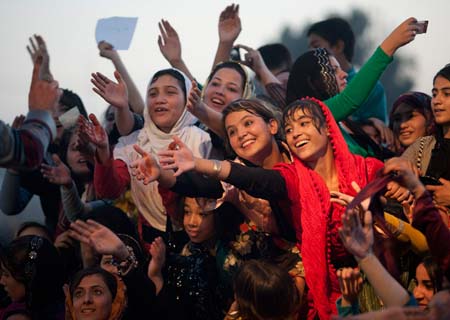Women have been the vulnerable part of our society within different regimes, yet they suffer painfully in one way or another. Afghan women and girls sustain singular acts of domestic and social violence. For instance, their husbands hurl vile epithet at them for being served cold tea, especially in remote areas, their opponent neighbors blacken their reputation and their fathers treat them with a deep feeling of hatred and animosity. As a result, a father raping his daughter over almost ten years without the family daring to intervene; a woman burnt after a family fight; another woman mutilated because her husband enjoyed doing so – these are just some of the cases of violence against women and girls that have been reported in Afghan media over the past months.
The fatherly asperity and social violence against Afghan girls and women reflect a flagrant violation of their rights. They are yet deemed inferior creature in our traditional and patriarchal society. The honor-killing acts are committed against them just for being female. In other words, men hurl insults at them, subjugate them in domestic life, curtail their freedom and abuse them in the worst possible way for the hack of it.
Furthermore, women are treated as a tool for satiating men’s carnal desires. The lurid reports regarding the girls raped by their neighbors or their close family members demonstrate this fact clearly. Perhaps, the perpetrators believe that women’s integral role is played in amorous films and advertisement gimmicks. Hence, such wrong attitudes towards women precipitate the sexual abuse against them.
On 9 September 2014, it came to light that a young woman from Kabul, Khatera, 22, had for years been raped by her father. It is not yet publicly known when the abuse started, but Khatera became pregnant from her father for the first time when she was 14 years old. Since, she had five more pregnancies – one every year. Her first four children were aborted in hospitals with the collusion of her family, but the fifth was born three years ago. Khatera is now pregnant with her sixth child. In an interview with a local TV on 9 September, she said that she did not know what she should do with the sixth child – and if she should call it sister or daughter. She said she was ashamed of her father. Her mother admitted in the video interview with local TV that she and Khatera’s two brothers knew that the father raped the girl, but kept silent because they were afraid for their lives. The two brothers at some point left because they found it “impossible to tolerate this big, shameful disgrace.”
Based on a second report, the victim in another case of incestuous rape is Sahiba, 17, one of nine children in her family, who has repeatedly been sexually assaulted by her father for almost one year. The case came to light when one night Sahiba decided to go to the police. The mother of the victim told a local TV that the father had started abusing Sahiba when they were still living in Laghman, before the family moved with their nomad tent to the Qarabagh district of Kabul five months ago. The atmosphere between the spouses seemed to have been tense, with the father and mother continuously arguing. The perpetrator was arrested and jailed; his wife and sons are demanding the death penalty. One son, 19, has announced that he would kill his father.
Moreover, in the Shahrestan district of Daikundi, the husband of Chaman Gul, 20, cut the young women’s nose off with a scythe. According to Jawad Dadgar from the Afghanistan Independent Human Rights Commission (AIHRC) in Daikundi, which had been following the case closely, Chaman Gul had also been beaten severely several times, “usually for household problems.” When the man wanted to take Chaman Gul to her father’s house to kill her, neighbors saved her, she later told Dadgar. Before the husband could be arrested, he escaped, allegedly joining a group of Taleban in Gizab district.
On 12 August 2014, an appeal court sentenced a man to death for having burned alive his brother’s pregnant wife, basing the sentence on article 20 of the EVAW law and article 402 of the penal code of Afghanistan. Article 20 of EVAW says that “If a person burns a woman or spray [sic] chemical or other poisonous substances on her body causing injury, or makes her eat a poisonous substance or injects it into her body, the offender in view of circumstances shall be sentenced to long term imprisonment not exceeding ten years.” (1) It adds that “If the commission of acts included in paragraph 1 of this Article is for the purpose of establishing fear in society in order to prohibit women from exercising their civil rights or results in the death of victim, considering the circumstances the offender shall be sentenced to long term imprisonment or to death penalty”. Article 402 of the Afghan penal code says, “A person who intentionally causes the abortion of a human fetus by beating or any other harmful means shall be sentenced to long imprisonment not exceeding seven years.”
Violence against women, which make the headlines on newspapers, is a matter of great concern. Hope the honor-killing and life-taking acts of violence to come end in near future. In short, people are supposed to consider the religious law and moral values which preclude men from harsh approaches against women.

